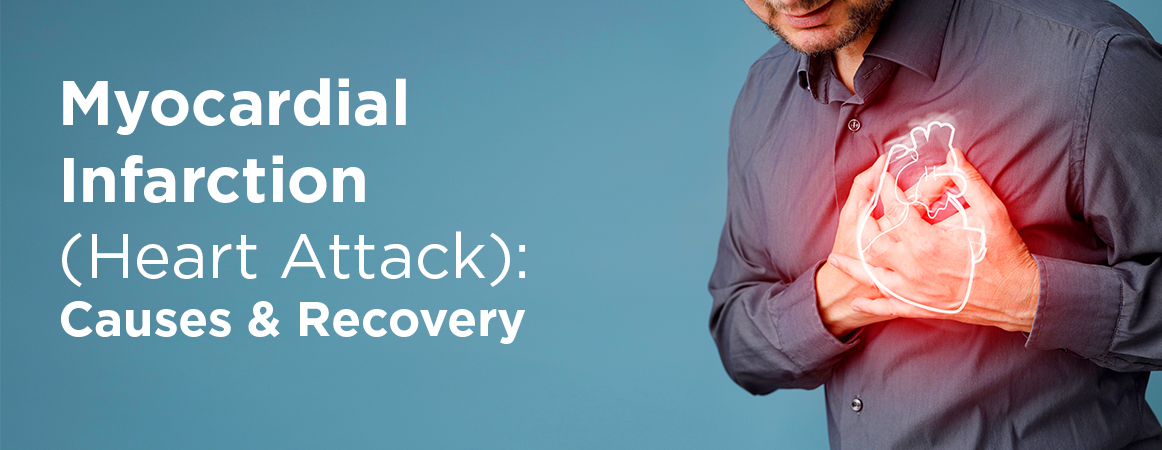Myocardial Infarction (Heart Attack): Causes and Recovery
Myocardial Infarction, commonly known as a heart attack, is a serious and life-threatening event that occurs when blood flow to a part of the heart muscle is blocked. In this article, we delve into the causes of myocardial infarction and explore the recovery process. Seeking immediate medical attention from top cardiologists in Karachi and receiving care at a specialized cardiology hospital in Karachi are crucial steps in the management and recovery from a heart attack.
The Anatomy of a Heart Attack:
Myocardial infarction occurs when the coronary arteries, responsible for supplying oxygen-rich blood to the heart muscle, become obstructed. This blockage can result from the buildup of cholesterol, fatty deposits, or blood clots, leading to damage or death of the heart muscle tissue.
Causes of Myocardial Infarction:
1. Coronary Artery Disease (CAD):
The primary cause of heart attacks is often coronary artery disease. Atherosclerosis, the buildup of plaques in the arteries, narrows the vessels and can eventually lead to a heart attack.
2. Unstable Angina:
Unstable angina, characterized by sudden and severe chest pain, can precede a heart attack. This condition indicates an increased risk of a myocardial infarction.
3. Blood Clots:
Blood clots can form in the narrowed arteries, blocking blood flow to the heart muscle. The formation of these clots is a critical factor in the onset of a heart attack.
4. Spasm of the Coronary Arteries:
Spasms in the coronary arteries can cause temporary blood flow reduction or complete blockage, triggering a heart attack.
Risk Factors for Myocardial Infarction:
1. Age and Gender:
The risk of a heart attack increases with age, and men are generally at a higher risk than premenopausal women. Nevertheless, women face an increased risk after reaching menopause.
2. Family History:
A family history of heart disease can contribute to a higher likelihood of myocardial infarction.
3. Smoking:
Smoking is a significant risk factor for heart attacks as it damages blood vessels, promotes the formation of blood clots, and accelerates atherosclerosis.
4. High Blood Pressure:
Hypertension puts extra strain on the heart, making individuals with high blood pressure more susceptible to heart attacks.
5. High Cholesterol Levels:
Elevated levels of LDL cholesterol (“bad” cholesterol) contribute to the buildup of plaques in the arteries, increasing the risk of a heart attack.
6. Diabetes:
Diabetes, especially when poorly controlled, raises the risk of heart attacks due to its impact on blood vessel health.
7. Obesity and Sedentary Lifestyle:
Being overweight or leading a sedentary lifestyle contributes to multiple risk factors, including diabetes, high blood pressure, and high cholesterol.
Recognizing Symptoms and Seeking Immediate Care:
1. Chest Pain or Discomfort:
Chest pain or discomfort, often described as pressure, squeezing, or fullness, is a common symptom of a heart attack.
2. Radiating Pain:
Discomfort might extend to the arms, neck, jaw, back, or abdomen.
3. Shortness of Breath:
Difficulty breathing or shortness of breath may occur, often accompanied by other symptoms.
4. Cold Sweats and Nausea:
Profuse sweating, nausea, and lightheadedness can be warning signs of a heart attack.
Recognizing these symptoms and seeking immediate medical attention at MMI Cardio Hospital, Karachi is crucial for a prompt and effective response.
Immediate Care and Treatment:
- Emergency Medical Services (EMS): Activating EMS is critical when experiencing symptoms of a heart attack. EMS professionals can provide essential care en route to the hospital.
- Diagnosis and Intervention: Top cardiologists in Karachi, often found in specialized cardiology hospitals, utilize diagnostic tools such as ECG, blood tests, and imaging studies to confirm a heart attack. Prompt intervention, such as angioplasty and stent placement, aims to restore blood flow.
Recovery Process:
- Hospitalization: Following a heart attack, hospitalization is necessary for monitoring and stabilization. Specialized cardiology hospitals in Karachi offer comprehensive care during this critical phase.
- Medications: Medications, including antiplatelet drugs, beta-blockers, and statins, are often prescribed to manage risk factors and support recovery.
- Cardiac Rehabilitation: Cardiac rehabilitation programs focus on lifestyle modifications, including exercise, dietary changes, and stress management, to enhance recovery and prevent future events.
- Ongoing Follow-up: Regular follow-up appointments with top cardiologists are essential for monitoring progress, adjusting medications, and addressing any emerging concerns.
Lifestyle Modifications for Long-Term Health:
- Healthy Diet: Adopting a heart-healthy diet rich in fruits, vegetables, whole grains, and lean proteins is crucial for long-term cardiovascular health.
- Regular Exercise: Engaging in regular physical activity, as guided by healthcare professionals, supports heart health and overall well-being.
- Smoking Cessation: Quitting smoking is a non-negotiable step for long-term recovery and heart health.
- Stress Management: Incorporating stress management techniques, such as meditation or counseling, contributes to a healthier lifestyle.
Conclusion:
Understanding the causes of myocardial infarction and adopting preventive measures are paramount for cardiovascular health. Immediate care from top cardiologists in Karachi at MMI cardiac hospital, Karachi is crucial during a heart attack. The recovery process involves comprehensive care, lifestyle modifications, and ongoing follow-up to ensure long-term heart health. By prioritizing prevention, seeking timely care, and making positive lifestyle choices, individuals can navigate the path to recovery and significantly reduce the risk of future cardiac events.


